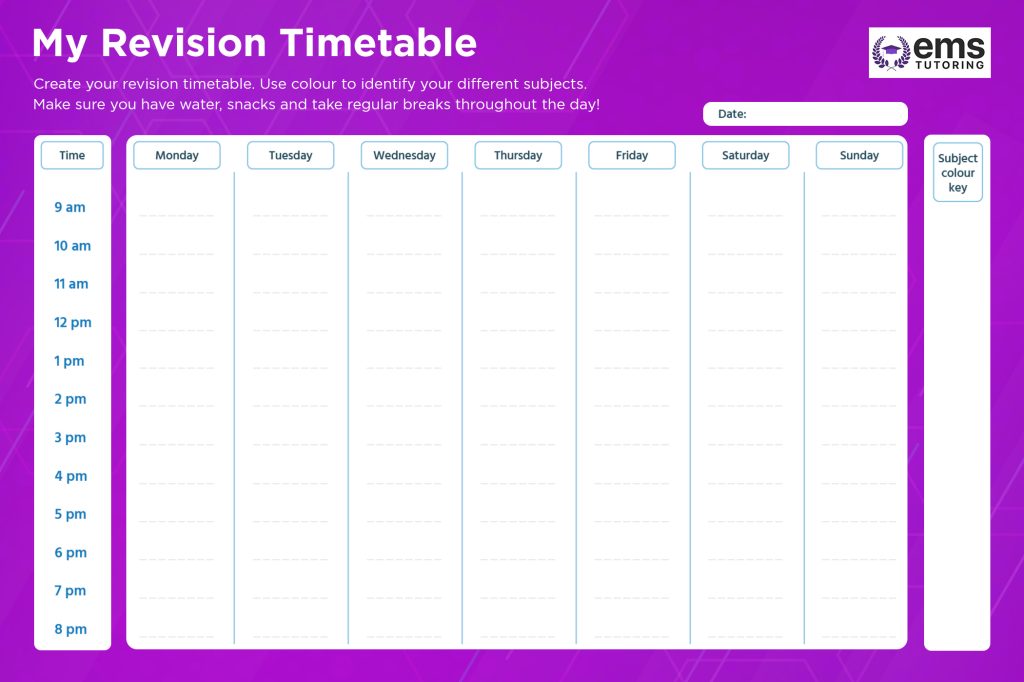A GCSE exam revision timetable is one of the practical tools to manage your study time and prepare for the exams. It helps students stay accountable and on track by reducing exam stress with optimised preparation time. You can include a study plan with a day-to-day breakdown of the content you must cover in each revision session with a detailed idea of what, when, and how to revise in the intended time.
This guide provides you the information about the importance of a practical revision timetable for GCSE exams, characteristics of an effective GCSE revision timetable and how to create it. Moreover, we have also covered how to create a revision timetable based on the time available before your exams, some tips to make the most out of your GCSE revision timetable, and additional considerations.
Why is a GCSE Revision Timetable Important?
A GCSE revision timetable made for yourself provides you with various advantages, such as it allows you to plan your time effectively by giving you complete control over planning the revision sessions. It allows you to break up the modules or topics to cover each day, providing a chance to track all the material you have covered.
Moreover, it maximises revision time, making you accountable for daily tasks and provides the option of making modifications based on your specific needs. In this way, it allows you to stay well-organised, learn the art of effective time management and allocate more time to individual topics you need to learn from scratch.

Characteristics of an Effective GCSE Revision Timetable
A GCSE revision timetable can be made effective if it meets the following characteristic requirements:
Adaptability
It would be best to accept that the timetable you made at the start of revision sessions might not go well with your schedule when you start studying. Therefore, your timetable should be adaptable to suit your requirements as time passes.
Flexibility
Your revision timetable should be flexible to easily accommodate those days when you are not feeling well and are tired. It will help you relieve the stress of completing the content on the same day, saving you from panic attacks. You will need to note the pending topics you could not complete on a particular day for revising at any other time.
Realistic
You should set realistic goals while creating a GCSE revision timetable, and you need to accommodate frequent breaks to digest all the revised information, take some rest, and stay active. For this purpose, you must realise that you cannot revise continuously for six or seven hours a day without breaks. In this way, you will be able to get a sense of achievement each day after the completion of tasks and not overwhelm yourself.

Creating an Effective GCSE Revision Timetable
You can either create an accumulated timetable to plan the revision for all subjects in one place or create separate timetables for individual subjects, as per your ease and requirements. You should follow these steps to create a GCSE revision timetable:
Think Critically
Before starting to plan and note down the revision timetable, you should think critically about the grade you want to achieve, your strong and weak subjects and topics, and the knowledge gaps you want to fill to achieve the desired results in all the subjects.
Set Goals
After identifying all the subjects and topics which need special attention, you should set realistic goals on how to revise all the topics effectively. For this purpose, you should allocate specific time to each subject and its topics so that you can get an overall picture of how much time is required to revise all the contents completely.
Divide Content
Once you have decided to make separate timetables for individual subjects or a single timetable for all, you must consider dividing the revision content appropriately. For this purpose, you should analyse your time before exams, your priority subjects and topics, and how to divide each subject into topics for easy revision.
Revision Interleaving
Interleaving is one of the popular approaches involving the mixing up of different topics for revision in a particular session. This techniques help you learn two or more related concepts, instead of focusing exclusively on one concept at a time. In this way, you can alternate between different topics, eliminating the need to spend a whole week revising the difficult topics and then setting them aside.
Include Leisure Time
You should incorporate some time for taking short breaks during study periods to relax your mind. In that time, you can enjoy talking with your family members or friends, and you can also do something interesting which is a part of your hobby. In this way, your mind will become fresh and ready to remember more things in an effective manner.

Creating Time-Based GCSE Revision Timetable
You can start revising your course for the GCSE exam at any time by making an appropriate timetable and following the relevant strategies. Based on the time available before your exams, you can plan your revision timetable as follows:
2 Months Before Exams
There are six to eight weeks in two months, and it is the ideal time to start revising for your GCSE exams. When you have two months, you can create a revision timetable by dividing your subjects into units, topics, and papers.
To learn and keep the revised content a part of your memory for longer, studying little portions of each subject in a single day rather than studying a single subject for an entire day is imperative. It would be best if you also made the revision notes for all the units and topics to have a quick overview of all the contents on the exam day.
1 Month Before Exams
In case of one month left in your exams, you will have less time to revise the content of all subjects. At this time, you need to prioritise the subjects based on their level of difficulty and your requirements of studying them for better understanding.
This way, you can list and revise priority subjects to relieve your worries. You should focus on solving the practice questions and recall the contents verbally, as you will not have the time to make flashcards.
2 Weeks Before Exams
At this time, when there are only Two left in your GCSE exams, what you can do is prepare two lists. One of the lists will contain the most underdeveloped topics and units of all the subjects which require thorough understanding. On the other hand, your high-performing questions, topics, and units should be included in the second list.
After preparing both lists, you should start working on a list with more content so that you can attempt most of the questions in your exams. Moreover, you can also revise questions that were a part of your quizzes and adopt the strategy of timed writing to get maximum benefits from your revision timetable.

How to Make the Most Out of the GCSE Revision Timetable?
There are some specialised strategies and techniques which you can employ to get the most out of your GCSE revision timetable and achieve higher grades in your exams. Some of those strategies and tips have been explained below:
Active Learning
For active learning, you should go through all the contents of your syllabus to trace those topics that may have been missed or require more understanding. In this way, you will be able to identify and make a separate list of tasks you need to study and learn in detail.
Using Flashcards
Flashcards are one of the practical revision tools which you can use to make the most out of your study timetable. You must mention the topic name on one side of the flashcard and write its answer on the other. Ultimately, you can separate the flashcards with wrong answers from those with correct answers to get an idea about the topics that need to be revisited for better understanding.
Practicing Questions
It would be best to practise the GCSE exam questions with solved answers to understand how to answer particular questions. In this way, you can also revise the content and identify different types of questions the examiners regularly ask.
Reviewing Past Papers
You can understand the exam’s dynamics by reviewing past papers and identifying what to expect on exam day. This strategy also helps you comprehend the marks allocation scheme in the exams by identifying how much information is required to get full marks in a particular question. This way, you can feel more confident about your answers on the exam day.




